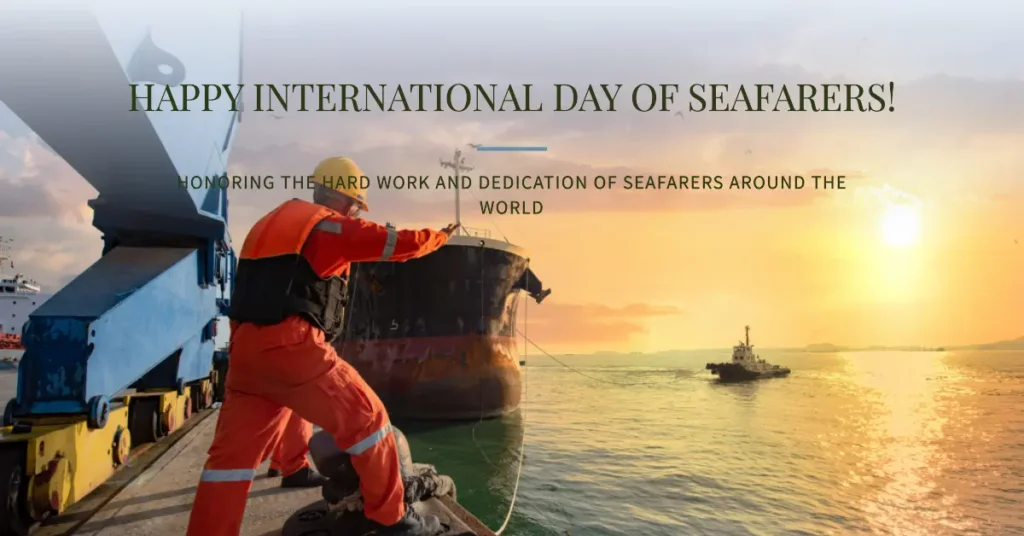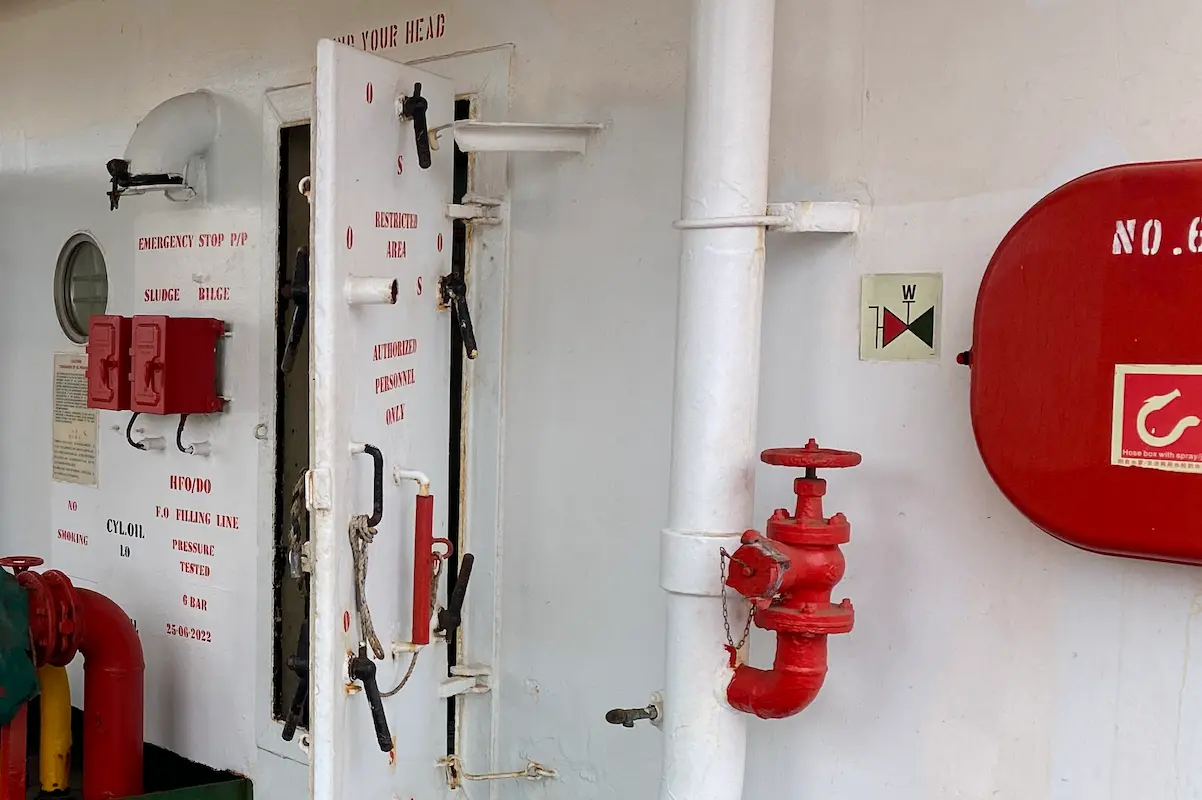International Day of the Seafarers is celebrated annually on June 25th to recognize the invaluable contribution of seafarers to the world economy. This day aims to create awareness about the challenges faced by seafarers and to appreciate their hard work. Seafarers play a crucial role in the global supply chain, transporting goods and commodities across the world.
The International Maritime Organization (IMO) designated the Day of the Seafarers in 2010, with the theme “Seafarers: at the core of shipping’s future.” The theme emphasizes the importance of seafarers in shaping the future of the shipping industry. The day is celebrated by organizations and individuals worldwide, with events and activities aimed at raising awareness about seafarers’ welfare and working conditions.
Despite their significant contribution to the global economy, seafarers face several challenges, including long working hours, poor living conditions, and limited access to medical care. The COVID-19 pandemic has further exacerbated these challenges, with seafarers facing travel restrictions and being stranded at sea for extended periods. The International Day of the Seafarers provides an opportunity to highlight these issues and promote the welfare of seafarers worldwide.

International Day of Seafarers Background and Significance
The International Day of Seafarers is celebrated every year on June 25th to recognize the invaluable contribution of seafarers to global trade and the world economy. This day was first established in 2010 by the International Maritime Organization (IMO), a specialized agency of the United Nations that regulates the safety and security of shipping and the prevention of marine pollution.
Seafarers play a crucial role in transporting goods and commodities across the world, with over 90% of global trade being carried by sea. Despite their vital contribution, seafarers often face challenging working conditions, including long periods away from home, isolation, and limited access to medical care and legal protection.
The theme for the 2023 International Day of Seafarers is “Fair Future for Seafarers”, which aims to raise awareness of the challenges facing seafarers and to advocate for their rights and welfare. The day provides an opportunity to recognize the sacrifices and hardships that seafarers endure and to show appreciation for their vital role in the global economy.
The COVID-19 pandemic has highlighted the importance of seafarers, as many have been stranded at sea for months due to travel restrictions and border closures. The IMO has been working to address this issue by calling on governments to recognize seafarers as key workers and to prioritize their vaccination and repatriation.
In conclusion, the International Day of Seafarers is an important day to recognize the contributions and challenges faced by seafarers. The 2023 theme of “Fair Future for Seafarers” highlights the need to advocate for the rights and welfare of seafarers, especially during the ongoing COVID-19 pandemic.
Theme of the Day
The International Day of the Seafarers is celebrated every year on June 25th. The theme of the day is to recognize the contribution of seafarers to the world economy and to promote their welfare. The day also aims to raise awareness about the importance of seafarers and the challenges they face.
This year’s theme is “Oceans Worth Protecting”. The theme highlights the importance of protecting the oceans and the role of seafarers in achieving this goal. The oceans are essential for life on earth, and they provide a range of benefits, including food, transportation, and recreation.
Seafarers play a vital role in protecting the oceans. They are responsible for transporting goods and people across the seas, and they must ensure that their vessels do not harm the marine environment. Seafarers also play a critical role in responding to maritime emergencies, including oil spills and other environmental disasters.
The World Maritime Theme for 2023 is “Connecting Ships, Ports, and People”. The theme emphasizes the importance of connectivity in the maritime industry and the need for collaboration between ships, ports, and people. The theme is relevant to the International Day of the Seafarers as it recognizes the role of seafarers in connecting the world through maritime trade.
In conclusion, the International Day of the Seafarers is an important day that recognizes the contribution of seafarers to the world economy and promotes their welfare. This year’s theme, “Oceans Worth Protecting”, highlights the importance of protecting the oceans and the role of seafarers in achieving this goal. The World Maritime Theme for 2023, “Connecting Ships, Ports, and People”, emphasizes the importance of connectivity in the maritime industry and the need for collaboration between ships, ports, and people.
Role of Seafarers
Seafarers play a crucial role in the shipping industry, ensuring that goods are transported safely and efficiently across the world’s oceans. They are responsible for the operation and maintenance of ships, as well as the safety of the crew and cargo on board.
The work of seafarers involves long voyages away from home, often lasting for months at a time. They work in a challenging and often dangerous environment, facing extreme weather conditions, rough seas, and the risk of piracy and other security threats.
Despite the challenges, seafarers are an essential part of the global workforce, providing a vital service that keeps the world’s economies moving. They are skilled professionals who are trained in a wide range of disciplines, from navigation and engineering to firefighting and first aid.
Seafarers also play an important role in ensuring that ships comply with international regulations and standards. They are responsible for maintaining the ship’s equipment and systems, as well as ensuring that the crew and cargo are transported safely and in compliance with all relevant laws and regulations.
In summary, seafarers are an essential part of the shipping industry, providing the skills and expertise needed to transport goods safely and efficiently across the world’s oceans. They work in challenging and often dangerous conditions, but their dedication and professionalism ensure that the world’s economies continue to function smoothly.
Impact on Economy
The International Day of Seafarers has a significant impact on the economy, especially in countries with a large seafaring industry. The seafaring industry is responsible for transporting goods and raw materials across the world, making it a crucial part of the global economy.
The seafaring industry is a significant contributor to the world economy, accounting for around 80% of global trade by volume and over 70% by value. The industry employs millions of people worldwide, contributing to the growth of many economies.
Seaborne trade has been growing steadily over the years, and the International Day of Seafarers helps to raise awareness of the importance of seafarers in the global economy. It also highlights the challenges they face, such as piracy, hazardous working conditions, and long periods away from their families.
The global economy is heavily dependent on seaborne trade, and disruptions to this industry can have a significant impact on the world economy. The COVID-19 pandemic, for example, has caused disruptions to the global supply chain, leading to shortages of goods and raw materials.
In conclusion, the International Day of Seafarers has a significant impact on the economy, highlighting the importance of the seafaring industry in the global economy. It also raises awareness of the challenges faced by seafarers and the need for better working conditions and support for this vital industry.
Training and Education
Training and education are essential components for individuals pursuing a career as a seafarer. The International Maritime Organization (IMO) has set standards for seafarer training and certification under the Standards of Training, Certification, and Watchkeeping (STCW) Convention. The STCW Convention outlines the minimum requirements for seafarers to ensure that they possess the necessary knowledge, skills, and experience to carry out their duties safely and efficiently.
Seafarers must undergo training and education in various areas, including safety, navigation, cargo handling, and communication. The training can be obtained through maritime academies, colleges, or training centers. These institutions offer a range of courses, from basic safety training to advanced specialized courses.
The education and training of seafarers are continuously evolving to keep up with the latest developments in technology and regulations. The IMO has introduced the concept of continuous professional development (CPD), which requires seafarers to update their knowledge and skills regularly. CPD ensures that seafarers remain competent and up-to-date with changes in the industry.
Experience is also a crucial aspect of seafarer training and education. Seafarers gain experience through onboard training and practical work. They must complete a specified period of sea service before they can be certified to work in a particular capacity.
In conclusion, training and education are vital for seafarers to ensure they possess the necessary knowledge, skills, and experience to carry out their duties safely and efficiently. The STCW Convention sets the minimum requirements for seafarer training and certification, and the concept of CPD ensures that seafarers remain competent and up-to-date with changes in the industry.
Safety and Health Concerns
The safety and health concerns of seafarers are of utmost importance. Seafarers face various risks and challenges while working on board ships, such as accidents, injuries, and illnesses. The International Labor Organization (ILO) has set up various regulations and guidelines to ensure the maritime safety and health of seafarers.
One of the significant health concerns of seafarers is mental health. The isolation and confinement of seafarers can lead to mental health problems such as depression, anxiety, and stress. The lack of access to proper medical care and support can worsen these conditions. Therefore, it is essential to provide adequate mental health support to seafarers.
Seafarers also face various safety concerns while working on ships. The risk of accidents, injuries, and fatalities is high due to the nature of their work. The use of heavy machinery, exposure to hazardous materials, and extreme weather conditions can lead to accidents and injuries. Therefore, it is crucial to provide proper safety training and equipment to seafarers to minimize the risk of accidents and injuries.
In addition to safety and health concerns, seafarers also face challenges related to medical care and shore leave. Seafarers may require medical attention while on board, and it is essential to provide them with proper medical care. Moreover, seafarers may face difficulties in obtaining shore leave due to various restrictions and regulations. Therefore, it is crucial to ensure that seafarers have access to medical care and shore leave when needed.
Overall, the safety and health concerns of seafarers are crucial and must be addressed to ensure their well-being. The implementation of proper regulations and guidelines can help minimize the risks and challenges faced by seafarers while working on ships.
Environmental Impact
Shipping is an essential component of the global economy, but it also has a significant impact on the environment. The environmental impact of shipping includes air pollution, water pollution, and greenhouse gas emissions. The marine environment is particularly vulnerable to the effects of shipping, as it can cause damage to marine ecosystems and wildlife.
The International Maritime Organization (IMO) has implemented regulations to reduce the environmental impact of shipping. The MARPOL Convention, for example, sets standards for the discharge of pollutants from ships. The convention aims to prevent pollution of the marine environment and promote sustainable shipping practices.
One of the biggest challenges facing the shipping industry is decarbonization. Shipping is responsible for around 2.5% of global greenhouse gas emissions, and this figure is expected to increase in the coming years. To address this issue, the IMO has set a target to reduce greenhouse gas emissions from shipping by at least 50% by 2050 compared to 2008 levels.
To achieve this target, the shipping industry is exploring a range of decarbonization options, including the use of alternative fuels such as biofuels, hydrogen, and ammonia. The industry is also investing in more energy-efficient ships and improving operational practices to reduce emissions.
In conclusion, the environmental impact of shipping is a significant issue that requires urgent action. The IMO and the shipping industry are working together to promote sustainable shipping practices and reduce the environmental impact of shipping. By implementing effective regulations and exploring new technologies, the industry can help to mitigate the impact of shipping on the environment and contribute to the fight against climate change.
Challenges and Solutions
The International Day of Safety for Seafarers is a crucial event that highlights the challenges faced by seafarers worldwide. Despite the efforts made by governments and organizations to improve the working conditions of seafarers, several challenges still exist. This section discusses some of the challenges faced by seafarers and the solutions to these challenges.
Challenges
One of the significant challenges faced by seafarers is the violation of their rights. Seafarers have the right to work in a safe and secure environment, but this is not always the case. Some seafarers are subjected to abuse, exploitation, and discrimination, which violates their human rights.
Another challenge faced by seafarers is the lack of certification. Seafarers need to have proper certification to work on a ship. However, some seafarers do not have the necessary certification, which puts their lives and the lives of others at risk.
The just transition to a sustainable maritime industry is another challenge faced by seafarers. The transition to a sustainable maritime industry requires significant changes in the way the industry operates. This change can lead to job losses and economic instability in some regions.
The COVID-19 pandemic has also created challenges for seafarers. The pandemic has disrupted the global supply chain, leading to delays and cancellations of crew changes. Some seafarers are stuck on ships for months, which affects their mental and physical health.
Solutions
To address the challenges faced by seafarers, governments and organizations must work together to ensure that seafarers’ rights are protected. This includes implementing policies and regulations that protect seafarers from abuse, exploitation, and discrimination.
To address the lack of certification, governments and organizations can provide training and education programs to help seafarers obtain the necessary certification.
The just transition to a sustainable maritime industry can be achieved by providing support and assistance to seafarers who are affected by the transition. This includes providing training and education programs to help seafarers transition to new jobs.
To address the challenges created by the COVID-19 pandemic, governments and organizations can implement measures to ensure that crew changes can take place safely. This includes providing personal protective equipment, testing, and quarantine facilities for seafarers.
In conclusion, the challenges faced by seafarers are significant, but solutions exist. Governments and organizations must work together to protect seafarers’ rights, provide training and education programs, and support seafarers affected by the just transition to a sustainable maritime industry.
Role of Social Media
Social media has become an essential tool for communication and outreach in today’s digital age. It has revolutionized the way people interact with each other and has created new opportunities for businesses and organizations to reach their target audience. The International Day of Seafarers is no exception, and social media has played a significant role in raising awareness and promoting the event.
The Secretary-General of the International Maritime Organization (IMO), Kitack Lim, has recognized the importance of social media in promoting the International Day of Seafarers. He has encouraged people to use social media platforms like Twitter, Facebook, and Instagram to share their messages of support for seafarers and to spread awareness about the challenges they face.
To make it easier for people to participate in the social media campaign, the IMO has created a hashtag (#DayoftheSeafarer) that people can use to share their messages and photos. The hashtag has been widely used on social media, and it has helped to create a sense of community among people who support seafarers.
Social media has also been used to showcase the contributions of seafarers to the global economy and to highlight the challenges they face. Organizations like the IMO have used social media to share stories of seafarers and to raise awareness about issues like piracy, abandonment, and the mental health of seafarers.
In conclusion, social media has played a vital role in promoting the International Day of Seafarers and raising awareness about the challenges faced by seafarers. It has allowed people from all over the world to connect and share their messages of support, and it has helped to create a sense of community among those who support seafarers.
Celebration and Tribute
International Day of Seafarers is a celebration of the hard work and dedication of seafarers around the world. It is a day to recognize the important role that seafarers play in the global economy and to pay tribute to their sacrifices and contributions.
Families of seafarers often face unique challenges, such as long periods of separation and uncertainty. On this day, they are recognized for their support and strength. It is an opportunity to acknowledge the sacrifices that families make to support their loved ones at sea.
The journey of a seafarer is full of challenges and adventures. They spend long periods of time away from home, navigating the world’s oceans and seas. This day is a chance to celebrate their resilience and determination in the face of adversity.
Life at sea can be both rewarding and challenging. Seafarers are responsible for the safe and efficient operation of vessels, often in difficult conditions. They work tirelessly to ensure that goods are transported safely and efficiently around the world.
International Day of Seafarers is also a time to share stories and experiences. It is a chance to learn from each other and to celebrate the diversity of the seafaring community. From navigating treacherous waters to experiencing new cultures, seafarers have a wealth of experiences to share.
In summary, International Day of Seafarers is a celebration of the seafaring community and a tribute to their sacrifices and contributions. It is an opportunity to recognize the challenges and adventures of life at sea, and to celebrate the resilience and determination of seafarers and their families.
Future of Shipping Industry
The shipping industry has undergone significant changes in recent years. The industry has been impacted by developments in technology, changes in international trade, and a growing awareness of the need for sustainable shipping practices. These trends are expected to continue, and the future of the shipping industry is likely to be shaped by a range of factors.
One of the most significant trends in the shipping industry is the increasing use of technology. Advances in technology have enabled shipping companies to improve efficiency, reduce costs, and enhance safety. For example, the use of autonomous ships is becoming more common, and this technology is expected to become increasingly prevalent in the coming years.
Another trend that is likely to shape the future of the shipping industry is the growing focus on sustainability. There is a growing awareness of the need to reduce the environmental impact of shipping, and this is leading to a range of initiatives aimed at promoting sustainable shipping practices. These initiatives include the use of alternative fuels, the development of more efficient shipping practices, and the adoption of new technologies to reduce emissions.
In addition to these trends, the future of the shipping industry is likely to be shaped by developments in international trade. The growth of e-commerce is expected to continue, and this is likely to drive demand for shipping services. At the same time, there are concerns about the impact of trade tensions and protectionism on the shipping industry, and these issues will need to be addressed in the coming years.
Overall, the future of the shipping industry is likely to be shaped by a range of factors, including technology, sustainability, and international trade. While there are challenges ahead, the industry is well-positioned to adapt and thrive in the years to come.
Frequently Asked Questions
What is the theme of the Day of the Seafarer 2023?
The theme of the Day of the Seafarer 2023 is yet to be announced.
When did the Day of the Seafarer start?
The Day of the Seafarer was first celebrated on June 25, 2011, after its establishment by the International Maritime Organization (IMO) in 2010.
What is the definition of a seafarer?
A seafarer is a person who works on a ship or a boat, either as a member of the crew or as a passenger.
What is the significance of International Day of the Seafarers?
The International Day of the Seafarers is significant because it recognizes the contributions of seafarers to the global economy and society. It also highlights the challenges and risks that seafarers face while working on ships, and the need to improve their working conditions and welfare.
What are some ways to celebrate International Day of the Seafarers?
Some ways to celebrate International Day of the Seafarers include organizing events and activities to raise awareness about the importance of seafarers, sharing stories and experiences of seafarers, and expressing gratitude and appreciation for their contributions.
Why is it important to recognize and support seafarers?
It is important to recognize and support seafarers because they play a crucial role in global trade and transportation. They are responsible for transporting goods and commodities across the world, and without them, many industries and economies would suffer. However, seafarers often face challenging working conditions, including long hours, isolation, and limited access to shore leave and medical care. Recognizing and supporting seafarers is essential to ensuring their well-being and the continued success of the maritime industry.
- 11 Boat Salvage Yards in Texas – January 18, 2025
- 7 Boat Salvage Yards in Michigan – January 15, 2025
- Fire Hose SOLAS Requirements, Regulation 10: Ensuring Maritime Safety – January 9, 2025



